HDI Compact 3D Scanners Unveiled

An HDI Compact 3D scanner can be deployed as on the desktop, embedded in devices or integrated into a system such as this robotic arm. Image courtesy of Polyga Inc.
Latest News
February 28, 2018
3D scanning and mesh processing technologies developer Polyga Inc. has announced the release of its new HDI Compact 3D scanner series. Designed for demanding industry applications, the HDI Compact 3D scanners, the company says, use blue LED structured-light technology to deliver high-quality 3D scan results at an ultra-fast scan speed. The turnkey HDI Compact systems can serve as standalone desktop 3D scanners, integrated into systems such as robotic arms or embedded into devices, the company adds.
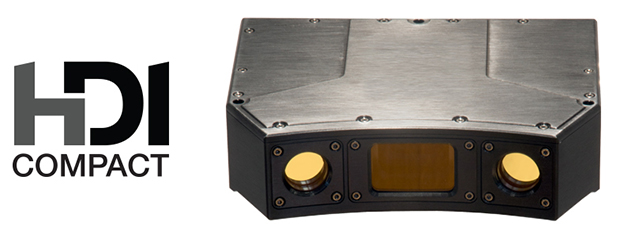 Polyga has introduced its dual-camera HDI Compact 3D scanner series for industrial applications. Series members use blue LED structured-light technology for rapid scanning and come with either 1.3-, 2.8- or 5.2-megapixel monochrome cameras for different scanning volumes. Image courtesy of Polyga Inc.
Polyga has introduced its dual-camera HDI Compact 3D scanner series for industrial applications. Series members use blue LED structured-light technology for rapid scanning and come with either 1.3-, 2.8- or 5.2-megapixel monochrome cameras for different scanning volumes. Image courtesy of Polyga Inc.HDI Compact systems are available in three models, each with a dual camera system calibrated for different scanning volumes. Each unit is housed in a solid aluminum body, and the housing is IP67 rated for dust proofing and water resistance. The systems can be used in conjunction with an optional rotary table for automated 3D object scanning, and multiple scanners can be linked together using one computer to reduce scan times for objects requiring a large field of view.
The HDI Compact systems work by projecting a series of blue LED light patterns onto the scan target. The cameras capture these images and send them to FlexScan3D, its supplied post-processing software to create a 3D model. FlexScan3D then cleans, merges and stitches multiple scans together to complete the digital 3D model. Supported export formats for such applications as visualization, reverse engineering and quality inspection include PLY, OBJ and STL.
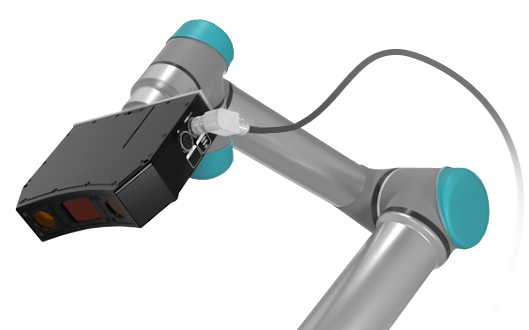 An HDI Compact 3D scanner can be deployed as on the desktop, embedded in devices or integrated into a system such as this robotic arm. Image courtesy of Polyga Inc.
An HDI Compact 3D scanner can be deployed as on the desktop, embedded in devices or integrated into a system such as this robotic arm. Image courtesy of Polyga Inc.The HDI Compact series of scanners come precalibrated. The systems weigh from a low 2.29 lbs. (1.05 kg) to a high 3.35 lbs. (1.52 kg). Unit dimensions range between 1.9x3.93x6.10-in. (49x100x155 mm) and 1.9x5.35x6.69-in. (49x136x170 mm).
The HDI Compact C109 model is equipped with two 1.3-megapixel monochrome cameras. It provides a field view of 3.42x2.67x3.46x3.42-in. (87x68x88x87 mm). Specifications include 300 ms scan speed, an average of 985,000 points per scan and up to 34-micron accuracy.
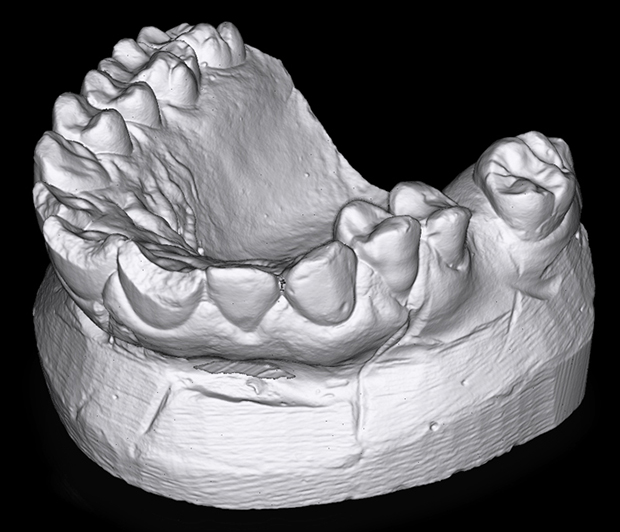 An HDI Compact C109 scanner was used to scan this image of a dental mold. Image courtesy of Polyga Inc.
An HDI Compact C109 scanner was used to scan this image of a dental mold. Image courtesy of Polyga Inc.The C210 model HDI Compact3D scanner has dual 2.8-monochrome-megapixel cameras. It has a 250 ms scan speed and a 2.79x3.85x3.93x6.06-in. (71x98x100x154 mm) field of view. Resolution averages 2 million per scan and scan accuracy up to 35 microns.
The pair of 5.2-megapixel monochrome cameras in the HDI Compact model C506, Polyga says, makes it ideal for 3D scanning extremely small objects. Specifications include accuracy of up to 12 microns per scan and a 333 ms scan speed.
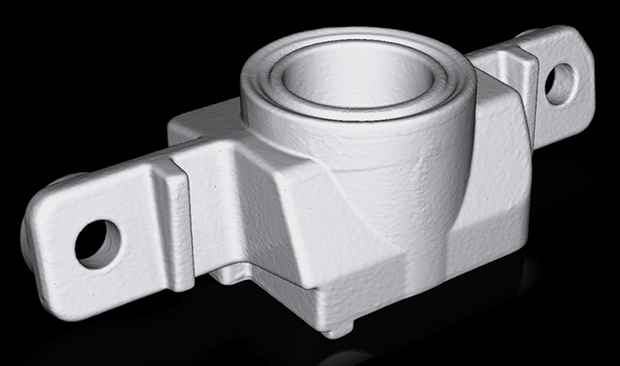 This metal part was scanned in with the HDI Compact C210 3D scanner. Image courtesy of Polyga Inc.
This metal part was scanned in with the HDI Compact C210 3D scanner. Image courtesy of Polyga Inc.Together with the HDI Compact 3D scanner series, Polyga announced a new version of its FlexScan3D software that also supports the Gocator 3000 series of 3D smart sensors from LMI Technologies. In addition to achieving 100% in-line inspection for factory automation at production speed, these snapshot sensors can now capture 3D scans to create full digital 3D models of parts for off-line analysis, the company explains.
“We found there is a strong demand for a solution that has the ease of use of a consumer-grade 3D scanner but the output of a professional 3D scanning system—in terms of capturing high-resolution 3D scans at sub-micron accuracy,” said Thomas Tong, president of Polyga, in the announcement. “The HDI Compact 3D scanners cover all these bases. They are plug-and-play systems, ready to use right out of the box within minutes of setup. Install the included proprietary 3D scanning software, FlexScan3D, to your computer and you are ready for scanning.”
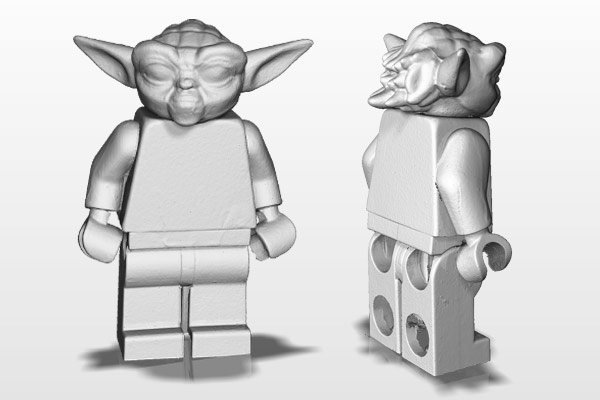 This miniature Yoda figurine was scanned in by an HDI Compact C506 scanner. Image courtesy of Polyga Inc.
This miniature Yoda figurine was scanned in by an HDI Compact C506 scanner. Image courtesy of Polyga Inc.The HDI Compact 3D scanners are available for purchase today. For more information, click here.
Download the HDI Compact 3D scanners brochure.
Go here for more on FlexScan3D software.
Watch a video on how blue LED structured-light scanners work.
See why DE‘s Editors selected HDI Compact 3D scanner series as their Pick of the Week.
Sources: Press materials received from the company and additional information gleaned from the company’s website.
Subscribe to our FREE magazine, FREE email newsletters or both!
Latest News
About the Author
Anthony J. Lockwood is Digital Engineering’s founding editor. He is now retired. Contact him via [email protected].
Follow DE




